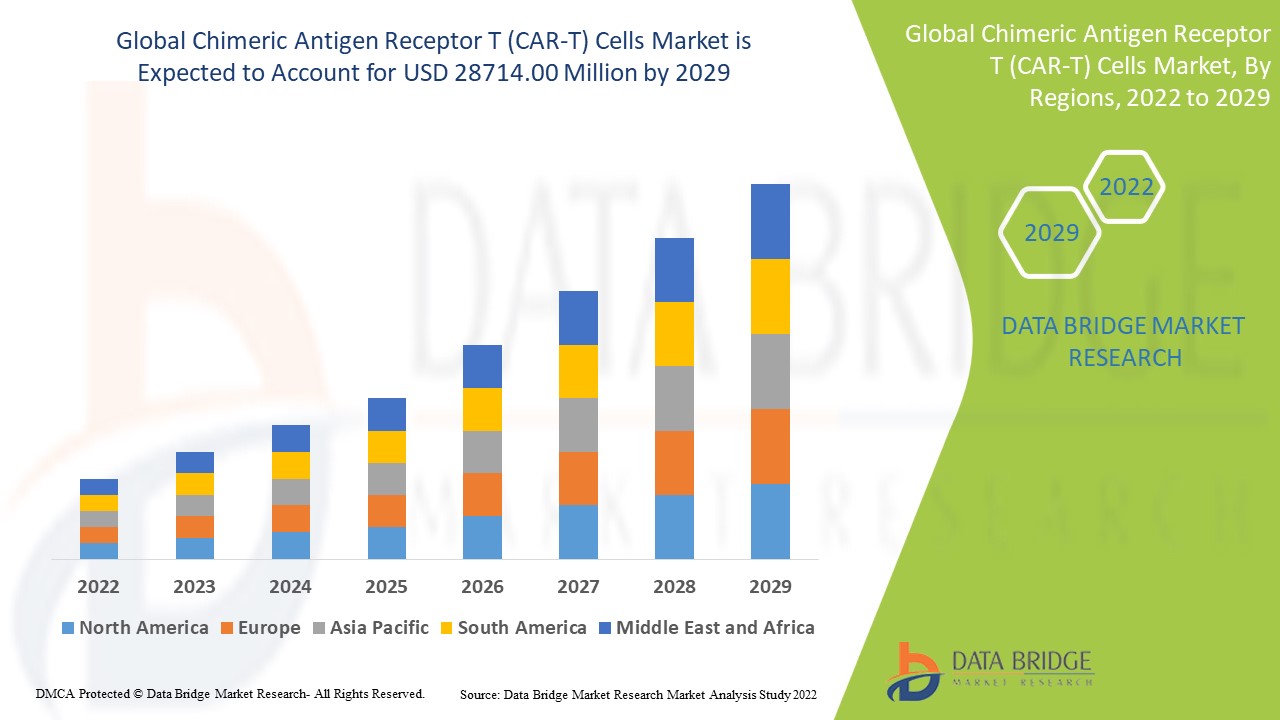Global Chimeric Antigen Receptor T Car T Cells Market
市场规模(十亿美元)
CAGR :
% 
 USD
5.36 Billion
USD
78.26 Billion
2024
2032
USD
5.36 Billion
USD
78.26 Billion
2024
2032
| 2025 –2032 | |
| USD 5.36 Billion | |
| USD 78.26 Billion | |
|
|
|
|
全球嵌合抗原受體 T (CAR-T) 細胞市場細分,按目標抗原(CD19、CD22 等)、應用(急性淋巴細胞白血病、瀰漫大 B 細胞淋巴瘤等)、最終用途(醫院、癌症研究中心、診所)劃分-產業趨勢及 2032 年預測
嵌合抗原受體T(CAR-T)細胞市場分析
近年來,嵌合抗原受體 (CAR) T 細胞治療領域取得了顯著成長,預計未來幾年仍將持續成長。研發活動投資的增加、新參與者的進入、產品創新、技術突破、有效的資源配置以及商業競爭對手之間為擴大區域和客戶群而日益激烈的競爭促進了行業的成長。
嵌合抗原受體T(CAR-T)細胞市場規模
2024 年全球嵌合抗原受體 T (CAR-T) 細胞市場規模價值 53.6 億美元,預計到 2032 年將達到 782.6 億美元,2025 年至 2032 年預測期內的複合年增長率為 39.82%。
報告範圍和市場細分
|
屬性 |
嵌合抗原受體T(CAR-T)細胞關鍵市場洞察 |
|
分割 |
|
|
覆蓋國家 |
北美洲的美國、加拿大和墨西哥、德國、法國、英國、荷蘭、瑞士、比利時、俄羅斯、義大利、西班牙、土耳其、歐洲其他地區、中國、日本、印度、韓國、新加坡、馬來西亞、澳洲、泰國、印尼、菲律賓、亞太地區 (APAC) 的其他地區、沙烏地阿拉伯、阿聯酋、南非、埃及、以色列、中東和非洲 (MEA) 的其他地區、其他地區的歐洲地區 |
|
主要市場參與者 |
諾華公司(瑞士)、輝瑞公司(美國)、吉利德科學公司(美國)、Autolus Therapeutics(英國)、科濟生物技術有限公司(英國)、Juno Therapeutics, Inc.(美國)、Sorrento Therapeutics, Inc.(美國)、Legend Biotech(美國)、Calyxt Inc. Inc.(法國)、MustSm(法國)、C CORPORATION(美國)、Eureka Therapeutics Inc.(美國)、Avacta Life Sciences Ltd.(英國) |
|
市場機會 |
|
嵌合抗原受體T(CAR-T)細胞市場定義
CAR-T 療法是一種治療方法,其中患者的 T 細胞(即免疫細胞)在實驗室中經過基因工程改造以殺死癌細胞。 T 細胞是從患者的血液中收集的。實驗室中的 T 細胞被賦予特定受體的基因,該受體可以與患者癌細胞上的特定蛋白質結合。嵌合抗原受體是一種特殊的受體(CAR)。 CAR-T細胞在實驗室中大量生產,然後注射到患者體內。 CAR-T 療法用於治療某些類型的血癌,並且也正在研究其用於治療其他癌症。
嵌合抗原受體T(CAR-T)細胞市場動態
驅動程式
- 癌症發生率不斷上升
在 2025-2032 年的預測期內,對先進技術解決方案和產品開發的投資水平不斷提高、細胞治療臨床研究數量的增加以及製藥行業的增長都將有助於加速嵌合抗原受體 T(CAR-T)細胞市場的成長。在預測期內,越來越多地使用細胞來治療各種血液學和實體腫瘤類型將增強許多前景,從而擴大嵌合抗原受體 T (CAR-T) 細胞市場。
- 患者數量不斷增加
預計癌症發病率的上升、對替代療法沒有反應的患者數量的增加以及醫療保健成本的上升都將在預測期內推動嵌合抗原受體 (CAR)-T 細胞治療市場的成長。
- Car-T細胞治療產品核准數量增加
隨著人們越來越了解這種治療癌症的新方法,對自身 T 細胞治療產品的需求也隨之增加。因此,領先的市場參與者正在致力於開發新產品,從而推動產業向前發展。 2017 年 10 月,美國食品藥物管理局批准使用基於細胞的基因療法Yescarta治療患有某些類型大 B 細胞淋巴瘤的成年患者。 Yescarta 的核准是癌症患者 CAR-T 細胞治療領域的突破。
- 增加研發療法
2028年,全球CAR-T細胞治療產業規模預計將達到150億美元。 CAR T 細胞療法提供者可能會受益於對肺癌、結直腸癌、多發性骨髓瘤和前列腺癌等癌症的研發藥物的更多關注 。除了癌症之外,研究人員還在驗證該療法對多種其他疾病的作用,例如愛滋病毒、自體免疫疾病、感染等,這將推動整個預測期內市場的成長。
機會
此外,隨著人們對效率的認識不斷提高,嵌合抗原受體 (CAR)-T 細胞治療市場預計將在未來幾年發展。然而,細胞療法導致的細胞激素釋放症候群 (CRS) 和其他神經系統疾病的可能性可能會在不久的將來為嵌合抗原受體 (CAR)-T 細胞療法產業提供進一步的成長前景。
限制/挑戰
在可預見的未來,高昂的治療成本和與 CAR T 細胞使用相關的負面影響將成為嵌合抗原受體 T (CAR-T) 細胞擴張的市場限制。
本嵌合抗原受體 T (CAR-T) 細胞市場報告提供了最新發展、貿易法規、進出口分析、生產分析、價值鏈優化、市場份額、國內和本地化市場參與者的影響的詳細信息,分析了新興收入來源、市場法規變化、戰略市場增長分析、市場規模、類別市場增長、應用領域和主導地位、產品批准、產品技術發布、地理市場創新方面的機會。要獲得有關嵌合抗原受體 T (CAR-T) 細胞市場的更多信息,請聯繫 Data Bridge Market Research 獲取分析師簡報,我們的團隊將幫助您做出明智的市場決策,實現市場成長。
嵌合抗原受體T(CAR-T)細胞市場範圍
嵌合抗原受體 T (CAR-T) 細胞市場根據目標抗原、應用和最終用戶進行細分。這些細分市場之間的成長將幫助您分析行業中成長微弱的細分市場,並為用戶提供有價值的市場概覽和市場洞察,幫助他們做出策略決策,確定核心市場應用。
標靶抗原
- CD19
- CD22
- 其他的
應用
- 急性淋巴性白血病
- 瀰漫大B細胞淋巴瘤
- 其他的
最終用戶
- 醫院
- 癌症研究中心
- 診所
嵌合抗原受體T(CAR-T)細胞市場區域分析
對嵌合抗原受體 T(CAR-T)細胞市場進行了分析,並按國家、目標抗原、應用和最終用戶提供了市場規模洞察和趨勢,如上所述。
嵌合抗原受體 T(CAR-T)細胞市場報告涵蓋的國家包括北美洲的美國、加拿大和墨西哥、歐洲的德國、法國、英國、荷蘭、瑞士、比利時、俄羅斯、義大利、西班牙、土耳其、歐洲其他地區、中國、日本、印度、韓國、新加坡、馬來西亞、澳洲、泰國、印尼、菲律賓、亞太地區(APAC)的其他地區、美國地區的其他地區、歐洲地區的其他地區。
由於癌症發生率高,北美在嵌合抗原受體 T(CAR-T)細胞市場佔據主導地位。
由於醫療保健基礎設施的完善以及人民可支配收入的增加,預計亞太地區將在 2025 年至 2032 年預測期內實現最高成長率。
報告的國家部分還提供了影響個別市場因素以及影響市場當前和未來趨勢的國內市場監管變化。下游和上游價值鏈分析、技術趨勢和波特五力分析、案例研究等數據點是用於預測各國市場情景的一些指標。此外,在對國家數據進行預測分析時,還考慮了全球品牌的存在和可用性及其因來自本地和國內品牌的大量或稀缺的競爭而面臨的挑戰、國內關稅和貿易路線的影響。
嵌合抗原受體T(CAR-T)細胞市場份額
嵌合抗原受體 T (CAR-T) 細胞市場競爭格局提供了競爭對手的詳細資訊。詳細資訊包括公司概況、公司財務狀況、收入、市場潛力、研發投資、新市場計劃、全球影響力、生產基地和設施、生產能力、公司優勢和劣勢、產品發布、產品寬度和廣度、應用優勢。以上提供的數據點僅與公司對嵌合抗原受體 T(CAR-T)細胞市場的關注有關。
嵌合抗原受體 T(CAR-T)細胞市場領導者包括:
- 諾華公司(瑞士)
- 輝瑞公司(美國)
- 吉利德科學公司(美國)
- Autolus Therapeutics(英國)
- 科濟生物治療有限公司(英國)
- Juno Therapeutics, Inc.(美國)
- Sorrento Therapeutics, Inc.(美國)
- 傳奇生物科技(美國)
- Calyxt Inc.(法國)
- Mustang Bio(美國)
- bluebird bio, Inc.(美國)
- 新基公司(美國)
- Eureka Therapeutics Inc.(美國)
- Avacta Life Sciences Ltd.(英國)
嵌合抗原受體T(CAR-T)細胞市場的最新發展
- 2021年2月,百時美施貴寶公司獲得美國FDA商業化許可後,上市銷售了Breyanzi(lisocabtagene maraleucel)。 Breyanzi 是一種基於細胞的基因療法,用於治療成人某些類型的大 B 細胞淋巴瘤
- 2020年7月,在獲得美國FDA商業化許可後,吉利德科學旗下子公司Kite Pharma推出了Tecartus。 Tecartus(brexucabtagene autoleucel,以前稱為 KTE-X19)是第一個也是唯一一個獲準用於治療復發或難治性套細胞淋巴瘤(MCL)成年患者的 CAR-T 細胞療法
SKU-
Get online access to the report on the World's First Market Intelligence Cloud
- Interactive Data Analysis Dashboard
- Company Analysis Dashboard for high growth potential opportunities
- Research Analyst Access for customization & queries
- Competitor Analysis with Interactive dashboard
- Latest News, Updates & Trend analysis
- Harness the Power of Benchmark Analysis for Comprehensive Competitor Tracking
研究方法
数据收集和基准年分析是使用具有大样本量的数据收集模块完成的。该阶段包括通过各种来源和策略获取市场信息或相关数据。它包括提前检查和规划从过去获得的所有数据。它同样包括检查不同信息源中出现的信息不一致。使用市场统计和连贯模型分析和估计市场数据。此外,市场份额分析和关键趋势分析是市场报告中的主要成功因素。要了解更多信息,请请求分析师致电或下拉您的询问。
DBMR 研究团队使用的关键研究方法是数据三角测量,其中包括数据挖掘、数据变量对市场影响的分析和主要(行业专家)验证。数据模型包括供应商定位网格、市场时间线分析、市场概览和指南、公司定位网格、专利分析、定价分析、公司市场份额分析、测量标准、全球与区域和供应商份额分析。要了解有关研究方法的更多信息,请向我们的行业专家咨询。
可定制
Data Bridge Market Research 是高级形成性研究领域的领导者。我们为向现有和新客户提供符合其目标的数据和分析而感到自豪。报告可定制,包括目标品牌的价格趋势分析、了解其他国家的市场(索取国家列表)、临床试验结果数据、文献综述、翻新市场和产品基础分析。目标竞争对手的市场分析可以从基于技术的分析到市场组合策略进行分析。我们可以按照您所需的格式和数据样式添加您需要的任意数量的竞争对手数据。我们的分析师团队还可以为您提供原始 Excel 文件数据透视表(事实手册)中的数据,或者可以帮助您根据报告中的数据集创建演示文稿。















